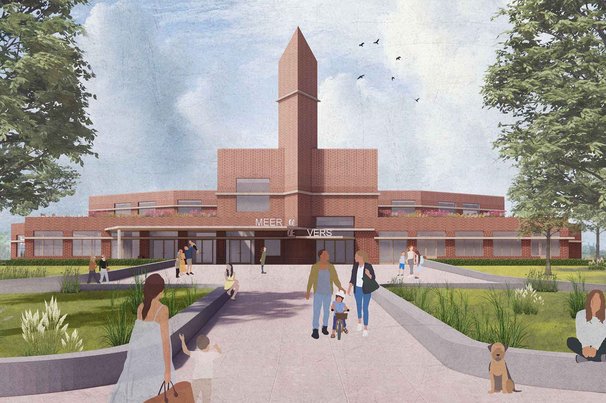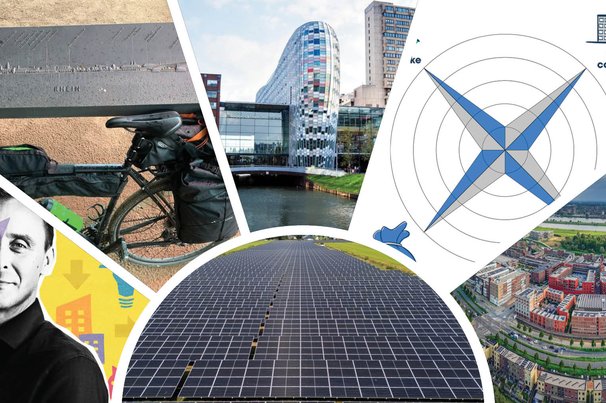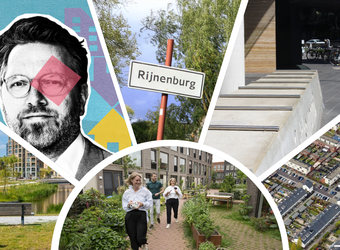Verslag The Chair Urban Area Development of the TU Delft, together with Inspiring Cities and Pameijer-TV filmed interviews with urban planners and entrepreneurs of two typical ‘arrival’ neighbourhoods, Oude Westen and Charlois. A total of twenty interviews, as well as a compilation-film can be viewed online at www.gebiedsontwikkeling.nu and www.inspiringcities.org.
Due to the book “Arrival city” (2010) by Doug Saunders, the city of Rotterdam has discovered the economic potential of its ‘arrival’ neighbourhoods. According to Doug Saunders, slums in developing countries and poor neighbourhoods in Western cities are linked because they are settlements in different stages of dynamic migration processes worldwide. He also convincingly argues that migrants are fundamental motors behind economic growth of cities, but only according to certain social and spatial conditions. Therefore, the city of Rotterdam came up with questions as: Which chances are offered by the city of Rotterdam to new arrivals? Which chances do new arrivals offer to the city? And: How can the city of Rotterdam improve its accommodations for new arrivals?
However, these questions are too complex to just pose them to urban planners or entrepreneurs. Furthermore, for our film-project we had to consider that people’s general capacity to concentrate on online news-items is limited to two minutes only. Therefore, the interviews had to be short and concise and we prepared several operational questions. For the Urban planners: What is it that fascinates you about the subject “Arrival city”? Why is this subject important? And: Does this subject give new insights on planning issues for the city? And for the migrant-entrepreneurs: When did you start with this business? How did you start? Is your family involved? Why on this location? Is your business successful?
In the three-day’s process of intense filmmaking, some important answers were given that I want to share with you.
According to Victor Mees from Antwerp our identity is formed by the city we live in and not by the country we come from. In other words, whom would you call a migrant? It was Tarek, our last interviewee, who questioned the existence of migrants, because he simply didn’t recognize himself as one, while having moved from Budapest to Amsterdam, presently living in Rotterdam and planning to move to Brussels. He told us he observed the world as an outsider, questioning his surroundings through the lens of his camera. He is one of our filmmakers.
Paul van der Laar stated as well that Rotterdam is as much an arrival city as it is a city of departure, and therefore a city of circulation. In history migrants settled in Rotterdam and often moved away again after some years, sometimes to return again in a later stage of their lives. This was indeed the case for Ronald Liong who we interviewed in his restaurant on the West-Kruiskade in the neighbourhood Oude Westen. As a young man he moved from Surinam to Holland, moved back and returned again due to the political chaos in his birthplace. Nowadays he runs a successful business and is planning to open more establishments in the same street. He left the city to live in the suburbs, but he is going to move back close to his restaurant. His children are working for him and it is his desire that they take over when he retires.
Ron van Gelder had introduced us to Ronald Liong. Ron knows everybody on the WestKruiskade because he is responsible for the upgrading-project of this central shopping-street. People from many different cultures are selling their goods here, therefore it is a very lively street. But it also has a bad image because of drug related problems and criminality. Far-reaching safety-measures have been taken, shop-owners receive subsidies to renovate their facades and time has come for new shops to attract a broader (and richer) public to this “Serengeti”-boulevard as Ron calls the West-Kruiskade. His goal is to advertise this street in every travel guide and to attract many visitors.
Floor Cornelisse did research on the Nieuwe Binnenweg, the parallel shopping-street on the West-Kruiskade that has similar problems and opportunities. For her art-project she asked shopowners to pose before the camera with a selling product they were most proud of. The video-films were shown on the Nieuwe Binnenweg and became the starting point for these entrepreneurs to discuss the future of their street. The project also stimulated the city of Rotterdam to re-think their top-down planned strategy for the street and instead to start with listening to the ideas and wishes of the shop-owners.
It was Justine Marseille who first put forward the confronting thesis that by nature people are bad trend watchers. We don’t see what we don’t know and tend to neglect innovative potentials when we do not have heard of them before. It needs curiosity and talent to find and show these hidden fruits. Floor Cornelisse succeeded in that.
On our last day we visited two international schools and interviewed teachers, parents and representatives of organizations that help expats to find their way in The Netherlands. Catherine Transler and Anupam Tripathy told us how they decided to become migrants instead of expats, thus choosing to stay in Holland for longer period of time because they felt at home or needed to settle down. Catherine also did research on the phenomenon of expats and discovered that expats generally feel very lonesome, and that this feeling is stronger in Holland than in any other country. Her personal explanation was that individualism and privacy in Holland are highly valued and Dutch citizens seldom mingle with people outside their circle of family and friends.
Expats told us that the city of Rotterdam is not paying much attention to new-arrivals. People are not helped to find their way to a job or a house. Information on regulations and procedures at the city hall, for example, is not available in the English language. At international schools parants receive important information and get in touch with fellow expats. The children are warmly welcomed in small classes where they receive lessons in English and can feel save. Their background and cultural identity are respected and with that they are stimulated to discover their new surroundings.
In Charlois we heard from entrepreneurs that for migrants arrival in Rotterdam is even harder. Without any money and connections it takes a long time to start to identify with the city they live in. Sometimes it takes generations. The biggest problem for them is to get the chance to meet and become acquainted with Dutch citizens. Spatial and social segregation is a fact and only Dutch artists and designers like Ivo van den Baar who belong to the so-called creative-class are willing to move to ‘arrival’ neighbourhoods of Rotterdam. And only very hard-working, talented and ambitious 2nd and 3rd generation migrants like Eylem get the chance to integrate and find a way to the top.
Hans, one of the filmmakers, approached me after we finished our last interviews with two urban planners who openly showed their inconvenience with the theme of immigration. He was emotional and upset. He said that in none of these interviews the real story of immigration had been told. He asked me if any of the professional urban planners at this congress had ever experienced an arrival without any means and knowledge of the city. He told me how lost and very ill he had become due to his migration from Nigeria to Holland. It had taken him decades to find his way around. He has lived for many, many years in Rotterdam, but only recently did he have his first conversation with a Dutch neighbour.
I realized he had a point and asked him to speak out in front of the camera. And I think he did a magnificent job, because he understood something very important. He understood that one cannot reach urban planners or any city-professional by telling a personal story, by talking about despair and pain. Instead, he translated his complex and dramatic life-experience into short and catching statements. For us to recognise. In two minutes, no more.
Zie voor de volledige publicatie:
Cover: ‘Charlois’





